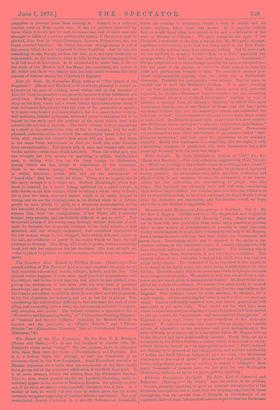Lost for Gold. By Katharine King, Anther of "The Queen
of the Regiment." (Hurst and Blackett.)—It is always pleasant to record an advance on the part of a young novel writer, and in the instance of Lost for Gold the pleasure is the greater, because it is the fulfilment of a prediction. Miss King's second novel is not so bright or so innocent a story as her first, which had a sweet, breezy light-heartedness about it that contrasted delightfully with the tone of the generality of novels; it is more complicated and more studied, but it is much batter written. Self-restraint, sounder judgment, increased grasp of character are to ba traced in the style, and the portions of the story which deal with colonial life are full of realism. The third volume is very interesting as a study of the adventurous side of life in Australia ; and the well- planned, audacious crime on which the catastrophe turns is led up to with skill which the author's first novel did not boast. But there is the same frank naturalness in Lost for Gold, the same freedom from conventionality. The people talk as men and women talk out of books, and the events coma about naturally. When the wilful girl, who has wrought her own misery by marrying a selfish, unprincipled man, is sailing with him on the long voyage to Melbourne, during which she has plenty of experience of his character, there is no violent .change wrought in her by trouble ; she is wilful, frivolous, selfish . still, and all the amusements of 4‘ board ship" find her ready for them. There are no tragedy airs in the story, though it is a tragic one. Herbert Mounteagle, whose boy- hood is crushed by a cruel wrong, saddened by a great sorrow, is ably drawn in the first volume, which is indeed a whole story in itself ; his is just the weak, wayward nature which is so easily warped to wrong, and we see the turning-point in his destiny when he is driven, partly by love, partly by pride, to a desperate determination to win the beautiful young woman who is endowed, as her very amusing aunt assures him, with "an amalgamation of the White and Courtenay temper, very peculiar, and particularly difficult to get on with." The downward course of the young man, through various descents of evil, until he becomes the desperate criminal of the third volume, is well sketched, and the strongly-contrasted, well sustained characters of the two women whom he has wronged, their widely different action in the end, are evidences of power in the writer which we hope she will continue to develop. Miss King still needs to prune, with an unsparing hand, not only her sentences, but her incidents. She does not spin out —she requires to practise no such economy—but she heaps on, unneces- sarily.


































 Previous page
Previous page